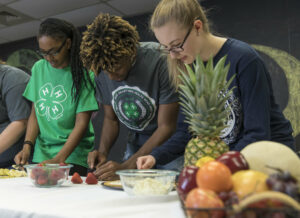Everyday Essentials: Teaching Teens the Skills That Matter Most
go.ncsu.edu/readext?1089511
en Español / em Português
El inglés es el idioma de control de esta página. En la medida en que haya algún conflicto entre la traducción al inglés y la traducción, el inglés prevalece.
Al hacer clic en el enlace de traducción se activa un servicio de traducción gratuito para convertir la página al español. Al igual que con cualquier traducción por Internet, la conversión no es sensible al contexto y puede que no traduzca el texto en su significado original. NC State Extension no garantiza la exactitud del texto traducido. Por favor, tenga en cuenta que algunas aplicaciones y/o servicios pueden no funcionar como se espera cuando se traducen.
Português
Inglês é o idioma de controle desta página. Na medida que haja algum conflito entre o texto original em Inglês e a tradução, o Inglês prevalece.
Ao clicar no link de tradução, um serviço gratuito de tradução será ativado para converter a página para o Português. Como em qualquer tradução pela internet, a conversão não é sensivel ao contexto e pode não ocorrer a tradução para o significado orginal. O serviço de Extensão da Carolina do Norte (NC State Extension) não garante a exatidão do texto traduzido. Por favor, observe que algumas funções ou serviços podem não funcionar como esperado após a tradução.
English
English is the controlling language of this page. To the extent there is any conflict between the English text and the translation, English controls.
Clicking on the translation link activates a free translation service to convert the page to Spanish. As with any Internet translation, the conversion is not context-sensitive and may not translate the text to its original meaning. NC State Extension does not guarantee the accuracy of the translated text. Please note that some applications and/or services may not function as expected when translated.
Collapse ▲N.C. Cooperative Extension has always been rooted in skill building. In its early days, the focus was on teaching methods to improve crop yields and implement best management practices on the farm. It also provided education, primarily to women, on how to safely preserve surplus food, grow home gardens, cook nutritious meals, and, later, manage household finances. Through 4-H, youth were taught many of these same essential skills and more. While Extension has evolved over the years, many of these original focus areas remain what I consider Everyday Essentials.

Youth learning about nutrition during a 1934 health day.
Starting at the end of September, I’ll be teaching a six-week program for youth ages 13 to 18, covering what I consider the Everyday Essentials: cooking and nutrition, financial literacy, civic engagement, and workforce readiness. There are a few things in life that you can’t avoid, including eating and, in some capacity, managing money. This program is designed to give young people the tools to enter adulthood with a strong foundation in key life skills that will benefit them long term.

Learning some foundational knowledge in the kitchen at a younger age is valuable.
The series will begin with two sessions focused on cooking. We will prepare meals together while learning and practicing a variety of cooking techniques. We will also cover basic nutrition, food safety, and meal planning. A 2023 national Cleveland Clinic survey found that 46 percent of Americans view healthy food as expensive, 23 percent lack the time to prepare healthy meals, and 20 percent don’t know how to cook healthy food. This course will offer practical tips to address these challenges.
Next, we will dive into financial management. The first session will introduce the basics of budgeting, understanding investing, and the concept of compound interest. The second session will involve a real-life simulation where participants consider the costs of services, unexpected life expenses, and how to make sound financial decisions.

Youth gain confidence and practical job skills through leadership development.
The final two sessions will focus on civic engagement and workforce preparedness. We will explore the different functions of government and identify which responsibilities fall to municipalities, counties, states, or the federal government. This will help participants better understand the types of decisions they are voting on, especially in local elections. The final session will focus on building professional skills. Students will be asked to bring a resume to share, and we will practice interview techniques.
Throughout the six weeks, participants will engage in public speaking within the group, build collaboration and communication skills through group work, and set personal goals as they navigate a key life transition. To learn more about this program, visit go.ncsu.edu/everydayessentials2025, or feel free to contact me via email or phone.
Morgan King is the Family & Consumer Sciences Extension Agent for N.C. Cooperative Extension – New Hanover County Center and Arboretum. The office is located at the Arboretum, 6206 Oleander Drive, and is open daily from 8 a.m. to 5 p.m. You can reach her at morgan_king@ncsu.edu or 910-798-7660.




